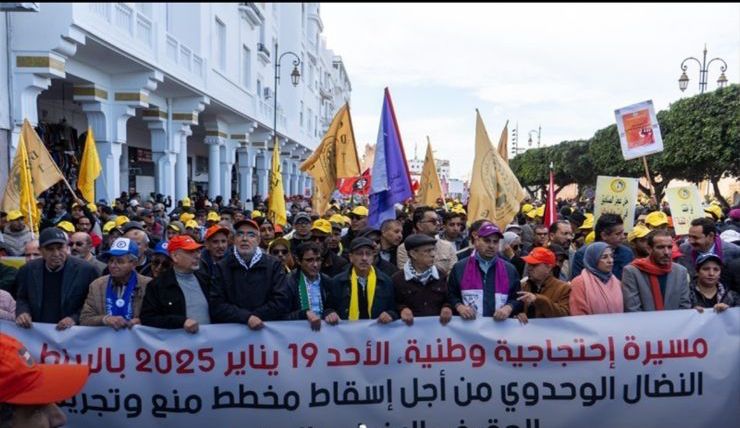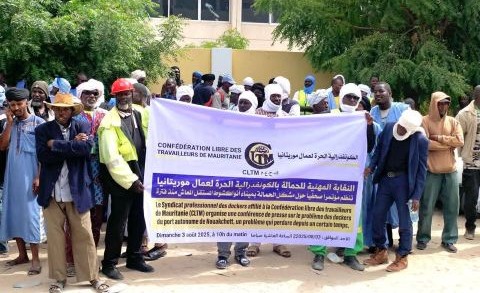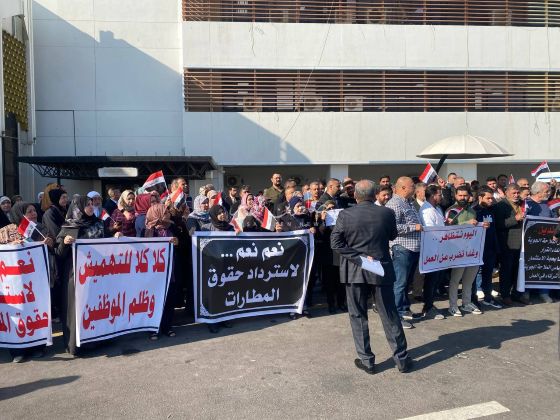المغرب: دخول قانون الإضراب 97.15 حيّز التنفيذ… ونقابات تحذّر من “تقييد غير مسبوق” لحقّ العمال في الاحتجاج
دخل القانون التنظيمي للإضراب رقم 97.15 حيّز التنفيذ في المغرب يوم 24 سبتمبر 2025، بعد أن نُشر رسميًا في الجريدة الرسمية خلال شهر مارس من العام نفسه، ومع انتهاء فترة الستة أشهر التي ينص عليها القانون لبدء تطبيق مقتضياته. ومع اللحظة الأولى لبدء العمل به، انفجرت موجة واسعة من ردود الفعل داخل الساحة النقابية المغربية، عبّرت في معظمها عن قلق مشروع من تأثير هذا التشريع الجديد على ممارسة واحد من أقدم وأقوى الحقوق العُمّالية: حقّ الإضراب.
ورغم أن الحكومة تعتبر القانون خطوة «لتنظيم المرفق العام وضمان السلم الاجتماعي»، ترى النقابات أن النصّ جاء محمّلًا بتدابير قد تجعل من ممارسة الإضراب عملية شبه مستحيلة أو على الأقل شديدة التعقيد، بدءًا من الشروط المسبقة، مرورًا بإجراءات الإشعار، وصولًا إلى العقوبات التي قد تطال المنظمين والمشاركين. واعتبرت نقابات كبرى أن هذا القانون لا يعكس روح الدستور المغربي الذي يُقرّ الحق في الإضراب، ولا يتماشى مع المعايير الدولية وعلى رأسها اتفاقيتي حرية التنظيم النقابي (87) والمفاوضة الجماعية (98) لمنظمة العمل الدولية.
النقابات المغربية سارعت إلى إصدار بيانات مشتركة وفردية تُحذّر فيها من “تقييد فعلي لحق الإضراب”، مشيرة إلى أن العديد من مواده قد تستعمل لثني العمال عن الاحتجاج أو لتمرير سياسات اجتماعية واقتصادية لا تحظى بقبول شعبي. وأكدت أن القانون صيغ في غياب حوار اجتماعي فعّال وشامل، مما جعله “يخدم مقاربة أحادية” بدل أن يكون ثمرة تفاوض بين الأطراف الثلاثة: الحكومة، النقابات، وأرباب العمل.
وفي مقابل ذلك، شدّدت النقابات على أن الإضراب ليس تهديدًا للاستقرار كما يروّج البعض، بل حقّ أساسي ووسيلة حضارية وفعّالة للدفاع عن الأجور، عن الحقوق، وعن العدالة الاجتماعية. وبالنسبة للحركة النقابية المغربية، فإن المساس بهذا الحق يعني المساس بتوازن الحياة المهنية وبمنظومة الديمقراطية الاجتماعية برمّتها.
كما أكدت العديد من المركزيات النقابية أن دخول هذا القانون حيّز التنفيذ لن يثنيها عن الدفاع عن العمال، وأن المرحلة المقبلة ستكون مرحلة نضال قانوني، ونقابي، وتوعوي، من أجل تعديل النصوص المثيرة للجدل، وضمان ألا يتحول القانون إلى أداة تكميم، بل إلى فضاء تنظيمي يحترم الحق الدستوري في الإضراب ويحمي العامل في مواجهة أي تعسف.
ويتابع الاتحاد العربي للنقابات باهتمام بالغ هذه التطورات في المغرب، مؤكّدًا أن حق الإضراب جزء لا يتجزأ من حرية التنظيم النقابي ومن أسس العدالة الاجتماعية. كما يشدّد على ضرورة انسجام التشريعات الوطنية في الدول العربية مع المعايير الدولية للعمل، بما يضمن حماية العمال ويعزز الحوار الاجتماعي بدل الحد منه.
ويعتبر الاتحاد أن اللحظة الحالية في المغرب هي لحظة اختبار للمسار الاجتماعي، وهي مناسبة لتجديد التأكيد على أن مستقبل العمل اللائق لا يمكن أن يُبنى بالقوانين المقيدة، بل بالشراكة الثلاثية، وبالاعتراف الكامل بدور النقابات كشريك أساسي في بناء السياسات العمومية.





